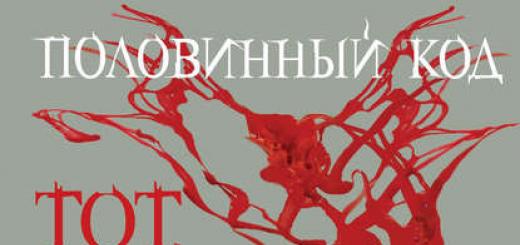Nadezhda Yakovlevna MANDELSHTAM
(1899-1980)
Nadezhda Yakovlevna Mandelstam (Khazina) was born on October 30, 1899 in Saratov.
Father is a barrister, mother is a doctor.
As a child, she visited Germany, France and Switzerland, received a good gymnasium education.
In the early 1940s, she took an external course at the university and defended her dissertation.
In 1919, Nadezhda Yakovlevna became the wife of the poet Osip Mandelstam. [Osip brought his wife from Kharkov]. "My life," she wrote, "begins with a meeting with Mandelstam."
In 1934, when the poet was arrested, he went with him to Cherdyn and Voronezh.
After the second arrest of Mandelstam, on the night of May 1-2, 1938, and the subsequent death of the poet in a transit camp near Vladivostok, Nadezhda Mandelstam devotes her life to preserving her husband's poetic legacy.
In the 60s she wrote the book "Memoirs" (first book edition: New York, Chekhov Publishing House, 1970), then, in the early 70s, the next volume of memoirs - "Second Book" (Paris: YMCA- PRESS, 1972) and, six years later, Book Three (Paris: YMCA-PRESS, 1978).
She died on December 29, 1980 in Moscow. She was buried at the Kuntsevo cemetery.
(From the project of Fateh Vergasov)
An excerpt from Irina Odoevtseva's book "On the banks of the Neva":

Steps on the stairs. Mandelstam cranes his neck and listens with a blissfully perplexed look.
- Is it Nadya. She went shopping,” he says in a changed, warmer voice. You will see her now. And you will understand me.
The door opens. But not Mandelstam's wife enters the room, but a young man. In a brown suit. Short haircut. With a cigarette in my mouth. He resolutely and quickly approaches Georgy Ivanov and holds out his hand to him.
- Hello, Georges! I recognized you right away. Osya correctly described you - a brilliant St. Petersburger.
Georgy Ivanov looks at her bewildered, not knowing whether it is possible to kiss the outstretched hand.
He had never seen a woman in a man's suit before. In those days, this was completely unthinkable. Only many years later, Marlene Dietrich introduced the fashion for men's suits. But it turns out that the first woman in pants was not she, but Mandelstam's wife. Not Marlena Dietrich, but Nadezhda Mandelstam revolutionized women's wardrobe. But, unlike Marlene Dietrich, this did not bring her fame. Her bold innovation was not appreciated either by Moscow or even by her own husband.
- Again you, Nadia, put on my suit. I don't dress up in your dresses, do I? What are you like? Shame, disgrace, he lashes out at her. And he turns to Georgy Ivanov, seeking his support. - If only you, Georges, convinced her that it is indecent. She doesn't listen to me. And wears out my suits.
She shrugged impatiently.
- Stop it, Osya, don't make marital scenes. Otherwise, Georges will think that you and I live like a cat with a dog. But we coo like doves - like "clay doves".
She puts a grid with all sorts of bundles on the table. NEP. And you can buy anything. There would be money.
- Well, you are here to enjoy a friendly meeting, while I cook dinner.
Mandelstam's wife, despite her deceptive appearance, turned out to be an excellent and hospitable hostess. Borscht and roast were followed by coffee with sweet pies and homemade jam.
- This is Nadia all by herself. Who could think? - he looks at his wife tenderly. - She can do everything. And so meticulous. Economical. I would be lost without her. Ah, how I love her.
Nadia smiles embarrassedly, serving him some jam.
- Come on, Osya, family delights are not more interesting than marital scenes. If we didn't love each other, we wouldn't get married. It's clear...
Creations:
Nadezhda Mandelstam is not only the widow of the great poet.
In the 60s and 70s, thanks to his "Second Book" of memoirs,
who went from hand to hand no less than Solzhenitsyn or Nabokov,
thanks to his sharp mind and unbending character
she became a cult figure for the intelligentsia.
Akhmatova was in St. Petersburg, Mandelstam was in Moscow.
The feat of a woman who for twenty years kept in her mind a whole collection of poems, who retained the clarity of her eyes, despite terrible trials, will never be forgotten by history. But this is not a "general history". This is the history of personalities, the history of great people. ... Three generations of the Shklovsky family were connected with Nadezhda Yakovlevna by almost family ties. Varvara Viktorovna SHKLOVSKAYA-KORDI remembers her
- Varvara Viktorovna, you inherited friendship with Nadezhda Yakovlevna. Probably, there were many stories in the family about the origins of this friendship - about the Petrograd House of Arts, with which many anecdotes are associated. For example, about Mandelstam's torn pants...
V.Sh .: - When Mandelstam brought Nadenka from Kyiv, he immediately brought her to meet her mother and father, with whom he was friendly. At the same time, he held a hat in his hand, closing a hole in his pants. Mom said: "Osip Emilievich, take off your trousers, now I'll sew everything for you." Nadia objected: “No way! He will then understand that it can be sewn up!
Insomnia. Homer. Tight sails.
I read the list of ships to the middle:
This long brood, this crane train,
That over Hellas once rose.
Like a crane wedge in foreign borders -
Divine foam on the heads of kings -
Where are you sailing? Whenever not Elena,
What is Troy to you alone, Achaean men?
Both the sea and Homer - everything is moved by love.
Who should I listen to? And here Homer is silent,
And the black sea, ornate, rustles
And with a heavy roar, he approaches the headboard.
- It seems that Mandelstam is the most pantsless person in Russian literature. Gorky gave him a sweater, although he refused trousers. Gumilyov gave him the trousers, and Mandelstam even said that he felt very manly in Gumilyov's trousers. Then, it seems, Kataev gave him pants ...
Kataev, I must say, lied everything in his "Diamond Crown". Everyone died, he appointed himself the Soviet Walter Scott, and suddenly it turned out that the dead are more interesting to the reader than he, the “living classic”: Olesha, to whom he gave three rubles for a hangover or not, Babel, Mandelstam ...
None of them had second pants - they didn’t trade in those, as my father used to say. My father's second pants appeared, probably, after seventy.
- There are legends about the extreme helplessness of Mandelstam: he was attacked by scoffers and suffered from this, he did not know how to heat the stove, while your father was good at it, they say, he knew how ...
Yes, none of them knew how to heat the stove. But they remembered Mandelstam. Of course, my father was more fun breaking chairs, because he had a different design ... But, in general, all these jokes are "named after Emma Gerstein." Her scandalous memoirs about Nadenka are akin to the Diamond Crown. My mother used to say: there is truth and there is mother truth. The fact that Nadezhda Yakovlevna had crooked legs is a typical womb truth. How much she did for Mandelstam, how many people she helped, how many she raised and taught - Emma Grigorievna for some reason does not remember. And he remembers about crooked legs ... Very selective memory. She told me how she once entered the Mandelstam's room in the Herzen House. Shklovsky sat in Turkish style on the bed, and Mandelstam ran from corner to corner - they had some kind of brilliant argument about literature: “You know, Varya, I can’t remember anything of what they were talking about ...” This is typical . Nonsense, gossip she remembers. And gossip, I think, enters a person not through the frontal lobes, but in other ways. Like pop music...
- When the Mandelstams returned to Moscow from exile in Voronezh, they were afraid to stay with you. Do you remember their appearance?
I remember my childhood embarrassment... 37 years old, I'm ten years old. Parents are not at home. Osip Emilievich took a bath, I feed him in the room behind the kitchen. Nadenka, who loved to bathe—she had missed it all her life—was splashing about in the bathtub... The squealing neighbor Lelya Povolotskaya came. Next to us in Lavrushinsky was supposed to live the writer Bruno Yasensky, who did not get to Lavrushinsky, disappeared in the Lubyanka. A communal apartment was formed in his apartment, in which this same Lelya Povolotskaya lived. So she came in when the Mandelstams were there. I don't remember under what pretext. So, I needed her, on the one hand, not to find Nadya or Osip Emilievich in the apartment, and on the other, not to rummage through her father's manuscripts ... And I jumped on one leg, depicting a child's game.
- That is, somehow your consciousness accepted it?
Such a life has been offered to us. There was no other ... Then, when Stalin died, Lelya came to us, sobbing, and asked my mother and aunt: “Why are you not crying? I know you never loved him!"
- What impression did the Mandelstams make on you as a married couple?
Back then, women were not supposed to be smart. As Anna Andreevna said: “While our men were alive, we sat in the kitchen and cleaned herring.” Once Nadezhda Yakovlevna allowed herself some decisive statement, and Osip Emilievich said: “Give a telegram to China to the Chinese: “Very smart period I give advice period I agree to come period.” And then he often said: "To China for the Chinese." So... Smart wives are not tolerated by many. After all, Nadezhda Yakovlevna, in addition to the women's gymnasium, passed the exams for a good men's one. This was enough for her to pass exams externally during the war and for the philological faculty of the university in Tashkent. Since childhood, she knew several languages: her parents drove her around Europe a lot. They would come to some new place and let them go for a walk in the morning - say, in Switzerland. She said: “I still remember the disgust: you go down into the yard, jump into the hopscotch, and there again another language.” She knew French very well. English. She spoke German. She learned Spanish - she needed to read something ...
I remember a Swede came to see her - she spoke Swedish to her. I asked: “Nadya, how many languages do you know?” -- "That is, as?" - “Well, in order to read, so that a conversation takes place, so that in another country you don’t feel like a stranger?” She began to count, lost her way ... Then she said: "Probably about thirty."
- Varvara Viktorovna, do you remember Nadezhda Yakovlevna after receiving the news of Mandelstam's death?
Nadenka immediately aged terribly. And she was only 39 years old. And it was necessary to preserve everything that Osip Emilievich wrote.
And after the war, when she arrived in Moscow already with a diploma, she went to the ministry, where the same unfortunate people like her stood along the wall all day, usually two days. They were called to the office and given directions to the provincial pedagogical universities. Nadenka agreed to everything. She was unpretentious. She demanded only one thing: the key to the teacher's toilet. She could not sit in a toilet for 12 people without partitions, with students. I don't think she had any other complaints. But for more than two years she did not work anywhere, because immediately, after the first demonstrative lesson, where the head of the department and other teachers came, it became clear how educated she was. She could not sit anyone, but every time the head of the department began to get hysterical. And two years later, she again came to the ministry, again stood in the corridor for two days and received the following referral ... And then her students came to her, these girls who graduated from universities, who understood that they put the sun on their heads instead of a hat.
- In her memoirs, Nadezhda Yakovlevna says several times: it is so impossible to live that you need to leave life ... And then, when Mandelstam died ...
She had an occupation that kept her here...
- How well you said - "occupation"!
But how! She remembered the poems of Osip Emilievich by heart ... She kept them in her memory for twenty years, it is impossible to write them down on paper - and you cannot die. She had no right.
- She was baptized in childhood ... Did you happen to observe her communication with her father Alexander Men, her spiritual father?
Nadya was very friendly with him. For several years she lived at his dacha in Semkhoz. I remember a dispute in Nadezhda Yakovlevna's kitchen between Lev Gumilyov and Men. The argument was about the devil and how to treat him. This was their first meeting. Arranged by Nadia. Gumilyov fired with all his knowledge, which was more complete knowledge and more qualified answer. He jumped on father Alexander from all sides and fired at him, but with a soft smile, he reflected all his volleys ...
Yes Yes. Finally, Gumilyov said that if the devil is acting, it means that God condones evil, because it is said after all: not a single hair will fly off your head, so that it would not be God's will. “Here I agree with you,” said Men ... It was an elegant argument ... And it ended with Gumilyov saying to Father Alexander: “Well, I did not expect to meet such an interlocutor. Not expected! But, tell me, you didn’t expect something like me either. ” Men replied: "Of course, a draw, by zero."
- Did Nadezhda Yakovlevna participate in their conversation?
No, she was silent, sitting in the corner. It was a duel.
--Nadezhda Yakovlevna was dying, knowing that in this country a person can rarely be calm about his posthumous fate. So, about Akhmatova's funeral, she said: "In this country, a person cannot die in peace." What do you remember about the death and funeral of Nadezhda Yakovlevna?
Before last day she continued to joke. She said: “Doctors advise me that I walk twice as much as I want. That's how I go. I want to go to the toilet, but when I go back, I don’t feel like it anymore ... ”She was weakening, the meetings were shorter, but we never left her alone for a minute. They took turns on duty... Then, when she was taken away, the apartment was sealed, it was unsealed after a certain time... But the archive was not lost. And the bird did not disappear - there was such an iron bird that Osip Emilievich always carried with him. We took her away. This is the only surviving thing that Osip Emilievich held in his hands. Another plaid with which Nadya was covered in the coffin. About which Mandelstam has verses:
"We have a cobweb
Scottish old plaid,
You cover me with it
like a military flag when I die ... "
They buried her in the Church of the Sign of the Mother of God behind the River Station. A woman was lying next to her - as if Fate had said - Anna was lying next to her, with a simple, slightly swollen face. There were terribly many people, the whole church vestibule was packed. When we carried out the coffin, a crowd of people stood close to each other to the right and left of us, and we sang “Holy God, Holy Mighty, Holy Immortal, have mercy on us.” We walked and sang all the way to the car. Then the photo appeared in the Parisian magazine Christian Vestnik, and my neighbor, who used to visit Verchenko, the secretary of the Union of Writers, told me: “The emigre magazine with your photo is lying on Verchenko’s table. What will you say if you are called?" I replied: “What I can tell you: I buried a friend - the way I would like to be buried ...”
Then, when the car drove into the cemetery, people in civilian clothes stood at the turn - they accompanied us all the time. We turned and along a narrow path in the snow, with the same singing, they carried Nadenka's coffin ...
Now next to her cross is a memorial stone with the name of Osip Emilievich. That's right: they come to her, which means they come to him...
http://atv.odessa.ua/programs/17/osip_mandel_shtam_chast_2_1823.html?order=DESC?order=ASC
An excerpt from Irina Odoevtseva's book "On the banks of the Neva":
Steps on the stairs. Mandelstam cranes his neck and listens with a blissfully perplexed look.
- Is it Nadya. She went shopping,” he says in a changed, warmer voice. You will see her now. And you will understand me.
The door opens. But not Mandelstam's wife enters the room, but a young man. In a brown suit. Short haircut. With a cigarette in my mouth. He resolutely and quickly approaches Georgy Ivanov and holds out his hand to him.
- Hello, Georges! I recognized you right away. Osya correctly described you - a brilliant St. Petersburger.
Georgy Ivanov looks at her bewildered, not knowing whether it is possible to kiss the outstretched hand.
He had never seen a woman in a man's suit before. In those days, this was completely unthinkable. Only many years later, Marlene Dietrich introduced the fashion for men's suits. But it turns out that the first woman in pants was not she, but Mandelstam's wife. Not Marlena Dietrich, but Nadezhda Mandelstam revolutionized women's wardrobe. But, unlike Marlene Dietrich, this did not bring her fame. Her bold innovation was not appreciated either by Moscow or even by her own husband.
- Again you, Nadia, put on my suit. I don't dress up in your dresses, do I? What are you like? Shame, disgrace, he lashes out at her. And he turns to Georgy Ivanov, seeking his support. - If only you, Georges, convinced her that it is indecent. She doesn't listen to me. And wears out my suits.
She shrugged impatiently.
- Stop it, Osya, don't make marital scenes. Otherwise, Georges will think that you and I live like a cat with a dog. But we coo like doves - like "clay doves".
She puts a grid with all sorts of bundles on the table. NEP. And you can buy anything. There would be money.
- Well, you are here to enjoy a friendly meeting, while I cook dinner.
Mandelstam's wife, despite her deceptive appearance, turned out to be an excellent and hospitable hostess. Borscht and roast were followed by coffee with sweet pies and homemade jam.
- This is Nadia all by herself. Who could think? - he looks at his wife tenderly. - She can do everything. And so meticulous. Economical. I would be lost without her. Ah, how I love her.
Nadia smiles embarrassedly, serving him some jam.
- Come on, Osya, family delights are not more interesting than marital scenes ...
Book "Memories"
Nadezhda Yakovlevna MANDELSHTAM
N. Ya. Mandelstam (nee Khazina) was born on October 30, 1899 in Saratov into a wealthy family of baptized Jews. Her father, Yakov Arkadyevich Khazin (d. 1930), was a barrister, and her mother, Vera Yakovlevna Khazina, worked as a doctor. Hope was youngest child in large family. In addition to her, two older brothers, Alexander (1891-1920) and Eugene (1893-1974), and sister Anna (d. 1938) grew up in the Khazin family. At the beginning of the 20th century, the family moved to Kyiv. There, on August 14, 1909, N. Ya. entered the private women's gymnasium Adelaide Zhekulina on Bolshaya Podvalnaya, house 36. Most likely, the gymnasium was chosen by the parents as the closest educational institution to the place of residence of the family (Reytarskaya street, house 25). A feature of Zhekulina's gymnasium was the education of girls according to the program of men's gymnasiums. Having successfully passed the entrance examinations, Nadezhda, nevertheless, studied at the secondary level. She was rated "excellent" in history, "good" in physics and geography, and "satisfactory" in foreign languages (Latin, German, French, English). In addition, as a child, Nadezhda visited several times with her parents the countries of Western Europe - Germany, France and Switzerland. After graduating from the gymnasium, Nadezhda entered the law faculty of St. Vladimir University in Kyiv, but dropped out of school. During the years of the revolution, she studied in the workshop of the famous artist A. A. Exter.
May 1, 1919 in the Kiev cafe "Kh. L. A. M "N. Ya. meets O. E. Mandelstam. The beginning of the novel of the famous poet with the young artist was recorded in his diary by the literary critic A. I. Deich:
"Comrade of black days"
On May 26, 1934, at a special meeting at the Collegium of the OGPU, Osip Mandelstam was sentenced to exile for three years in Cherdyn. On May 28, Nadezhda Yakovlevna obtained permission to accompany her husband into exile. Shortly after arriving in Cherdyn, the original decision was reconsidered. As early as June 3, she informed the poet's relatives that Mandelstam in Cherdyn was "mentally ill, delirious." On June 5, 1934, N. I. Bukharin wrote a letter to I. V. Stalin, where he reported on the plight of the poet. As a result, already on June 10, 1934, the case was reviewed and instead of exile, Osip Mandelstam was forbidden to live in 12 cities Soviet Union. The couple hastily left Cherdyn, deciding to settle in Voronezh. There they met the poet S. B. Rudakov and the teacher of the Voronezh Aviation College N. E. Shtempel. With the latter, N. Ya. Mandelstam maintained friendly relations throughout her life.
After the second arrest, which took place on the night of May 1-2, 1938, the poet was exiled to a transit camp near Vladivostok, where he died of cardiac asthma.
Years of wandering
After the death of her husband, Nadezhda Yakovlevna, fearing arrest, changes her place of residence several times. In addition, she devotes her life to preserving her husband's poetic legacy. Fearing searches and arrest along with the manuscripts of Osip Mandelstam, she memorizes his poems and prose by heart.
The beginning of the Great Patriotic War N. Ya. Mandelstam found in Kalinin. The evacuation, according to her recollections, was swift and "terribly difficult." Together with her mother, she managed to board the ship, and in a difficult way they got to Central Asia. Before leaving, she collected the manuscripts of her late husband, but had to leave some of the documents in Kalinin. First, N. Ya. Mandelstam ended up in the village of Muynak in Kara-Kalpakia, then she moved to a collective farm near the village of Mikhailovka, Dzhambul region. There, in the spring of 1942, E. Ya. Khazin discovered her. Already in the summer of 1942, N. Ya. Mandelstam, with the assistance of A. A. Akhmatova, moved to Tashkent. Presumably, this happened around July 3, 1942. In Tashkent, she passed the exams for the university externally. At first, N. Ya. Mandelstam taught foreign languages at the Central House of Artistic Education of Children. In May 1944, he began working in the Central Asian state university teacher in English.
In 1949, N. Ya. Mandelstam moved from Tashkent to Ulyanovsk. There she works as an English teacher at the local teacher's college. In February 1953, N. Ya. Mandelstam was fired from the institute as part of a campaign against cosmopolitanism. Since the dismissal almost coincided with the death of Stalin, serious consequences were avoided.
Through the mediation of the influential Soviet writer A. A. Surkov, she received a teaching position at the Chita Pedagogical Institute, where she worked from September 1953 to August 1955.
From September 1955 to July 20, 1958, N. Ya. Mandelstam taught at the Cheboksary Pedagogical Institute, where she headed the department. In 1956, under the guidance of V. M. Zhirmunsky, she defended her Ph.D. thesis in English philology on the topic “Functions of the accusative case based on materials from Anglo-Saxon poetic monuments.”
In the summer of 1958, N. Ya. Mandelstam retired and moved to Tarusa, a small town located 101 km from Moscow, which made it possible for former political prisoners to settle there. This made Tarusa a popular destination for dissident intellectuals. An informal leader among the local intelligentsia was K. G. Paustovsky, who, having connections in Moscow, was able to draw the attention of the authorities to the problems of a provincial city. In Tarusa, N. Ya. Mandelstam began to write her Memoirs. In 1961, taking advantage of concessions from above, the collection Tarusa Pages was published in Kaluga, where N. Ya. Mandelstam published under the pseudonym Yakovleva.
In 1962, dissatisfied with a modest pension, she got a job as a faculty teacher foreign languages to the Pskov State pedagogical institute and worked there until 1964.
Return to Moscow
In November 1965, N. Ya. managed to move into her own Moscow one-room apartment on Bolshaya Cheryomushkinskaya Street, where she lived until the end of her life. In her small apartment, she arranged something like a social and literary salon, which was regularly visited by the capital's intelligentsia (Yu. Freidin, A. Sinyavsky, V. T. Shalamov, S. Averintsev, B. Messerer, B. Akhmadulina, etc.) , as well as Western Slavists (S. Brown, J. Malmstad, P. Troupin, etc.), who were interested in Russian literature and the work of O. E. Mandelstam.
In the 1960s, Nadezhda Yakovlevna wrote the book Memories (first book edition: New York, Chekhov Publishing House, 1970). Then, in the mid-1960s, the poet's widow began a lawsuit with the famous art critic, collector and writer N. I. Khardzhiev. Having quarreled over the archive of O. E. Mandelstam and the interpretation of individual poems by the poet, Nadezhda Yakovlevna decided to write her own commentary on her husband's poems. This work was completed by the mid-1970s.
Comes out in the early 70s new volume memoirs N. Ya. - "The Second Book" (Paris: YMCA-PRESS, 1972), which caused a mixed reaction. Shortly before Mandelstam's death, Book Three was published abroad (Paris: YMCA-PRESS, 1978).
For many years she was a close friend of Anna Akhmatova. After the death of the poet in 1966, she wrote memoirs about her (first full publication - 2007). Playwright A.K. Gladkov (1912-1976), who read a draft of the manuscript, noted the ambiguity of Mandelstam's interpretation of Akhmatova's image: "A.A. she is very lively, but somehow small, poser and clearly inferior to the author of the memoirs in mind and subtlety. A completely new interpretation of history marriage to Gumilyov: she never loved him."
Death
Throughout the 1970s. Mandelstam's health was steadily deteriorating. She rarely left the house, spent a lot of time in bed. However, until the end of the decade, Mandelstam was able to receive friends and relatives at home.
In 1979, heart problems worsened. Her activity began to decline, only the closest people helped. In early December 1980, at the age of 81, Mandelstam was prescribed strict bed rest, it was forbidden to get out of bed. On the initiative of one of the closest people, Yu. L. Freidin, round-the-clock duty was arranged. The people closest to her were entrusted with duty near the dying Mandelstam.
On the night of December 29, 1980, while Vera Lashkova was on duty, Nadezhda Yakovlevna Mandelstam died. Mandelstam was buried according to the Orthodox rite, farewell to the body took place on January 1, 1981 in the Church of the Sign of the Mother of God. She was buried on January 2, 1981 at the Staro-Kuntsevsky (Troekurovsky) cemetery.
Heritage
The memoirs of N. Ya. Mandelstam were recognized not only as an indispensable source in the study of the work of O. E. Mandelstam, but also as significant evidence of the Soviet era, and especially the Stalin era. The literary merits of her books were highly appreciated by many literary critics and writers (Andrey Bitov, Bella Akhmadulina, Sergei Averintsev and others). Brodsky compared two volumes of her memoirs with "Judgment Day on earth for her century and for the literature of her century."
For many years, N. Ya. Mandelstam was a close friend of Anna Akhmatova. After the death of the Russian poetess, Mandelstam wrote memoirs about Akhmatova. In them, she tried to critically evaluate the personality and work of Akhmatova (first full publication - 2007). .
reception
Disputes about the significance and objectivity of the works of N. Ya. Mandelstam began immediately after their publication. Many of those who knew N. Ya. and her husband personally split into two hostile camps. Some defend the right of N. Ya. Mandelstam to judge not only the era, but also specific people, others accuse the poet's widow of settling scores with contemporaries, slandering and distorting reality (this was especially true of the "Second Book"). The well-known literary historian E. G. Gershtein, in her memoirs, gave a sharp rebuke to Mandelstam’s assessments in the Second Book, presenting counterclaims to the poet’s widow.
In the West, Mandelstam's memoirs received a wide response. Both "Memoirs" and "Second Book" were published in many countries, and the works themselves began to be regarded as an important source for Stalin's time.
The artist Nadenka Khazina became the wife of Osip Mandelstam in May 1919. They met in Kyiv when she was nineteen years old.
“We easily and insanely agreed on the first day, and I stubbornly insisted that two weeks would be enough for us, if only “without worries,” she later recalled. - I did not understand the difference between a husband and a casual lover ...
Since then, we no longer parted ... He did not like to part so much because he felt how short the time was allotted for us - he flew by like a moment.
Nadenka Khazina (according to Anna Akhmatova, ugly but charming) was born in Saratov in the family of a lawyer, her childhood and youth passed in Kyiv. Parents (apparently, people are by no means poor) took her to Germany, France and Switzerland. Nadenka knew French and English very well, spoke German, and learned Spanish later - she needed to read something ...
After graduating from high school, the girl took up painting. But everything was crossed out by her meeting with Osip Mandelstam. Having married, they alternately lived in Leningrad, Moscow, Ukraine and Georgia.
“Osip loved Nadia incredibly, implausibly,” recalled A. Akhmatova. - When her appendix was cut in Kyiv, he did not leave the hospital and all the time lived in a closet with a hospital porter. He did not let Nadia go a step away from him, did not allow her to work, was furiously jealous, asked her advice about every word in poetry. In fact, I have never seen anything like it in my life. The surviving letters of Mandelstam to his wife fully confirm this impression of mine.
In the autumn of 1933, Osip Mandelstam finally received a Moscow apartment - two rooms on the fifth floor, the ultimate dream for that time. Before that, he and Nadia had to push around in different corners. For many years it has not been printed, no work has been given. One day, Osip Emilievich told his wife: "We need to change our profession - now we are beggars."
You haven't died yet, you're not alone yet,
While with a beggar friend
You enjoy the majesty of the plains
And haze, and cold, and blizzard.
In luxurious poverty, in mighty poverty
Live calm and comforted, -
Blessed are those days and nights
And sweet-voiced labor is sinless...
“When Mayakovsky arrived in St. Petersburg in the early 1910s, he became friends with Mandelstam, but they were quickly taken away to different sides- recalled Nadezhda Yakovlevna later in her book. - It was then that Mayakovsky told Mandelstam his life wisdom: “I eat once a day, but it’s good ...” In the famine years, Mandelstam often advised me to follow this example, but the fact of the matter is that people do not have enough to this "once a day".
And - nevertheless ... As the poet Viktor Shklovsky recalled: “Living in a very difficult conditions, without boots, in the cold, he managed to remain spoiled. As a rule, Mandelstam took for granted any help given to him and his Nadya. Here is a quote from the memoirs of another of his contemporary, Elena Galperina-Osmerkina:
“Osip Emilievich looked at me carelessly, but also haughtily. In the language of words, this could be translated as follows: “Yes, we are hungry, but do not think that it is a courtesy to feed us. This is the duty of a decent person."
Many people remember the young wife of Osip Emilievich as a woman of a quiet and inconspicuous, silent shadow of the poet. For example, Semyon Lipkin:
“Nadezhda Yakovlevna never took part in our conversations, she sat with a book in the corner, throwing up her bright blue, sadly mocking eyes at us ... Only in the late 40s at Akhmatova on Ordynka, I was able to appreciate the brilliant caustic mind of Nadezhda Yakovlevna.”
Nadezhda Yakovlevna had a hard time with her husband. He was a lively person, amorous and quite spontaneous. He was fond of often and a lot, and, very jealous of his wife, brought his girlfriends to the house. There were violent scenes. With Nadia, whose health left much to be desired, he treated, apparently, dismissively. It got to the point that the poet's father, visiting his son and finding him with two women - his wife and another mistress with the affectionate nickname Buttercup, said: "That's good: if Nadia dies, Osya will have Buttercup ..."
Fate decreed otherwise: Buttercup, that is, Olga Vaksel, an addicted and emotional nature, committed suicide in 1932. And Nadya… Nadya stayed with Osip.
Today in most publications family life The Mandelstam couple is shown in a pink light: a loving husband, a devoted wife... Nadezhda Yakovlevna was indeed devoted to the poet. And one day, exhausted by the duality of her position and leaving her husband with a hastily packed suitcase, she soon came back ... And everything returned to normal. “Why did you get it into your head that you must be happy?” - Mandelstam answered the reproaches of his wife.
... Reading his new poems to his wife, Osip Emilievich was angry that she did not immediately memorize them. “Mandelstam could not understand how I could not remember the poem that was in his head and not know what he knows. Dramas about this happened thirty times a day ... In fact, he needed not a wife-secretary, but a recorder, but he could not demand from a recorder an understanding in addition, as from me, she recalled. - If he didn’t like something recorded, he wondered how I could meekly write down such nonsense, but if I rebelled and didn’t want to write something down, he said: “Shush! Don’t interfere… You don’t understand anything, so keep quiet.” And then, having dispersed, he sarcastically advised sending to Shanghai ... a telegram with the following content:
"Very clever. I give advice. agree to come. To China. the Chinese."
The history of the poet's exile in Voronezh is widely known. In May 1934, for the poem "We live, not smelling the country under us ..." he was exiled for three years to Cherdyn-on-Kama. It was said that the nervous, weak Osya “handed over” at Lubyanka those nine or eleven people to whom he read his poems, among them his close friend Anna Akhmatova, and her son Lev Gumilyov, and the poetess Maria Petrov, whom he was very passionate about. At a prison meeting with his wife, he listed the names of the people appearing in the investigation (that is, those named by him among the listeners) so that Nadezhda Yakovlevna could warn everyone.
After the hassle of Boris Pasternak, Anna Akhmatova and other writers, the Mandelstams were allowed to leave for Voronezh. By the way, they chose this place themselves, obviously because of the warm climate; they were forbidden to live only in twelve cities of Russia.
After the first arrest, Osip Emilievich fell ill, according to Nadezhda Yakovlevna, with traumatic psychosis - with delirium, hallucinations, and a suicide attempt. Back in Cherdyn, the poet jumped out of a hospital window and broke his arm. Obviously, his mind was really clouded: Osip Emilievich considered the arches in honor of the Chelyuskinites to be set ... in connection with his arrival in Cherdyn.
In May 1937, the Mandelstams returned home to Moscow. But one of their rooms turned out to be occupied by a person who wrote denunciations on them, and besides, the poet did not receive permission to stay in the capital. However, there was not much time left before the next arrest ...
In these terrible years Hiding from the watchful KGB eye, Nadezhda Yakovlevna carefully kept everything that was written by her husband: every line, every piece of paper that his hand touched. Like hundreds of thousands of wives of "writhing innocently under the bloody boots of Russia" (A. Akhmatova), she knocked all the thresholds, stood in long lines in order to find out at least something about her husband. She was lucky at the time. She found out “for what” and how many years her husband received, but did not know where he was sent by escort from Butyrka prison.
Still not knowing about the death of her husband, Nadezhda Yakovlevna asked Beria for intercession ...
What remained was her letter addressed to Osip Emilievich, “a human document of piercing power,” according to the definition of Primorsky local historian Valery Markov.
“Osia, dear, distant friend! My dear, there are no words for this letter, which you may never read. I write it into space. Maybe you'll come back and I'll be gone. Then it will be the last memory.
Oksyusha - our children's life with you - what happiness it was. Our quarrels, our squabbles, our games and our love... And the last winter in Voronezh. Our happy poverty and poems ...
Every thought is about you. Every tear and every smile is for you. I bless every day and every hour of our bitter life, my friend, my companion, my blind guide...
Long life. How long and difficult it is to die alone - alone. Is this fate for us - inseparable? ..
I didn't have time to tell you how much I love you. I can't say even now. You are always with me, and I - wild and angry, who never knew how to just cry - I cry, I cry, I cry. It's me, Nadia. Where are you? Goodbye. Nadia".
“In those days when this letter was written, O. Mandelstam was already in Vladivostok in a transit camp (the area of \u200b\u200bthe present Sea Town), V. Markov narrates. – Probably, he felt when the lines of the unsent letter were born. How else to explain that it was on these days, on the twentieth of October, that he wrote a letter to his brother Alexander (Shura), which, fortunately, reached the addressee.
“Dear Nadenka, I don’t know if you are alive, my dove…” Mandelstam asked in a letter. These were the last lines of the poet, read by his wife ... On December 27, 1938, on a day filled with a snowstorm, Osip Mandelstam died on a plank bed in barrack No. ", was thrown into the former fortress moat already in the new year - 1939."
By the way, according to the latest archival research, the poet died after all in the Magadan camps...
In June 1940, Nadezhda Yakovlevna was presented with Mandelstam's death certificate. According to this document, he died in the camp on December 27, 1938 from heart failure. There are many other versions of the death of the poet. Someone said that he saw him in the spring of 1940 in a party of prisoners who were sent to Kolyma. He looked about seventy years old, and he gave the impression of a mentally ill person ...
Nadezhda Yakovlevna settled in Strunino, a village in the Moscow Region, worked as a weaver in a factory, then lived in Maloyaroslavets and Kalinin. Already in the summer of 1942, Anna Akhmatova helped her move to Tashkent and settled her. Here the poet's wife graduated from the university and received a diploma in teaching English. In 1956, she defended her Ph.D. thesis. But only two years later she was allowed to live in Moscow ...
“She has a wayward character,” recalls the Tashkent writer Zoya Tumanova, who studied English with Nadezhda Yakovlevna as a child. - She is kinder to me than to boys, sometimes affectionately ruffles my hair, and she spit on my friends in every possible way, as if testing for strength. In retaliation, they look for lines in the book of poems by Innokenty Annensky - “Well, right about Nadezhda! Listen":
I love the offense in her, her terrible nose,
And the legs are compressed, and a rough knot of braids ... "
Seeing the teacher's thick folio in Italian, the children asked: "Nadezhda Yakovlevna, do you also read Italian?" “Children, two old women, we have been engaged in literature all our lives, how can we not know Italian?” she replied.
Nadezhda Yakovlevna lived to the time when Mandelstam's poems could already be transferred to paper. And poetry, and "The Fourth Prose", and "Conversation about Dante" - all that she remembered by heart. Moreover, she also managed to write three books about her husband ... Her memoirs were first published in Russian in New York in 1970. In 1979, the poet's widow donated the archives to Princeton University (USA).
When Nadezhda Yakovlevna received fees from abroad, she gave away a lot, otherwise she simply took her friends and led them to Beryozka. She presented Father Alexander Menu with a fur hat, which in her circle was called "Abram Tsarevich". Many of the women she knew wore "mandelstams" - that's what they themselves called the short fur coats from "Birch" presented by Nadechka. And she herself walked in the same fur coat ...
From archival publications recent years it is known that Nadezhda Yakovlevna tried to arrange her life on a personal level even at the time when her husband was in prison, and after that too. It didn’t work out ... Once she confessed:
“I want to tell the truth, the whole truth, but I won’t tell the whole truth. The last truth will remain with me - no one but me needs it. I think even in confession before this final truth no one comes."
Mandelstam was fully rehabilitated only in 1987. It didn't work out, Russian tradition, and without extremes - works, albeit gifted, but still not fully revealing its creative potential the author is often put on a par with Pushkin's masterpieces ...
Nadezhda Yakovlevna Mandelstam (maiden name Khazina, October 30, 1899, Saratov, the Russian Empire- December 29, 1980, Moscow, USSR) - Russian writer, memoirist, linguist, teacher, wife of Osip Mandelstam.
N. Ya. Mandelstam (nee Khazina) was born on October 30, 1899 in Saratov into a wealthy family of baptized Jews. Her father, Yakov Arkadyevich Khazin (d. 1930), was a barrister, and her mother, Vera Yakovlevna Khazina, worked as a doctor. Nadezhda was the youngest child in a large family. In addition to her, two older brothers grew up in the Khazin family, Alexander (1891-1920) and Eugene (1893-1974) and sister Anna (d. 1938). At the beginning of the XX century. the family moved to Kyiv. There, on August 14, 1909, N. Ya. entered the private women's gymnasium Adelaide Zhekulina at 36 Bolshaya Podvalnaya. . A feature of Zhekulina's gymnasium was the education of girls according to the program of men's gymnasiums. Having successfully passed the entrance examinations, Nadezhda, nevertheless, studied at the secondary level. She had 5 points in history, "good" in physics and geography, and "satisfactory" in foreign languages (Latin, German, French, English). In addition, as a child, Nadezhda visited several times with her parents the countries of Western Europe - Germany, France and Switzerland. After graduating from high school, Nadezhda entered the law faculty of St. Vladimir University in Kyiv, but dropped out of school. During the years of the revolution, she studied in the workshop of the famous artist A. A. Exter.
May 1, 1919 in the Kiev cafe "Kh. L.A.M "N. Ya. meets O. E. Mandelstam.
On May 26, 1934, at a special meeting at the Collegium of the OGPU, O. M. was sentenced to exile for three years in Cherdyn. On May 28, N. Ya. obtained permission to accompany her husband into exile. Shortly after arriving in Cherdyn, the original decision was reconsidered. As early as June 3, N. Ya. informed the poet's relatives that Mandelstam in Cherdyn was "mentally ill and delirious." On June 5, 1934, N. I. Bukharin wrote a letter to I. V. Stalin, where he reported on the plight of the poet. As a result, already on June 10, 1934, the case was reviewed and, instead of exile, O. Mandelstam was forbidden to live in 12 cities of the Soviet Union. The couple hastily left Cherdyn, deciding to settle in Voronezh. There, the Mandelstam couple met the poet S.B. Rudakov and teacher of the Voronezh Aviation College N.E. Stamp. With the last N.Ya. Mandelstam maintained relationships throughout her life.
After the second arrest, which took place on the night of May 1-2, 1938, the poet was exiled to a transit camp near Vladivostok, where he died of typhus.
After the death of her husband, Nadezhda Yakovlevna, fearing arrest, changed her place of residence several times. In addition, she devotes her life to preserving her husband's poetic legacy. Fearing searches and arrest along with O.M.'s manuscripts, she memorizes Mandelstam's poetry and prose.
After the start of the Great Patriotic War, N. Ya. Mandelstam and his mother were evacuated to Central Asia. At first they lived in the village of Muynak in Kara-Kalpakia, then they moved to a collective farm near the village of Mikhailovka, Dzhambul region. There, in the spring of 1942, they were discovered by E.Ya. Khazin. Already in the summer of 1942, N.Ya. Mandelstam with the assistance of A.A. Akhmatova moves to Tashkent. Presumably, this happened around July 3, 1942. In Tashkent, she passed the university exams externally. At first, Mandelstam taught foreign languages at the Central House for the Artistic Education of Children. In May 1944, he began working at the Central Asian State University as an English teacher.
In 1949, Mandelstam moved from Tashkent to Ulyanovsk. There she works as an English teacher at the local teacher's college. In February 1953, Mandelstam was fired from the institute as part of a campaign against cosmopolitanism. Since the dismissal almost coincided with the death of Stalin, serious consequences were avoided.
Thanks to the mediation of the influential Soviet writer A.A. Surkova, she received a teaching position at the Chita Pedagogical Institute, where she worked from September 1953 to August 1955.
From September 1955 to July 20, 1958, Mandelstam taught at the Cheboksary Pedagogical Institute, where she even headed the department. In 1956, she defended her Ph.D. thesis in English philology "Functions of the accusative case based on materials from Anglo-Saxon poetic monuments" under the guidance of V. M. Zhirmunsky.
In the summer of 1958, Mandelstam retired and moved to Tarusa, a small town located 101 km from Moscow, which made it possible for former political prisoners to settle there. This made Tarusa a popular place for the dissident intelligentsia. The informal leader among the local intelligentsia was K.G. Paustovsky, who, having connections in Moscow, was able to draw the attention of the authorities to the problems of a provincial town. In Tarusa, N.Ya. Mandelstam began to write her "Memoirs". In 1961, taking advantage of the concessions from above, the collection "Tarus Pages" was published in Kaluga, where N.Ya. Mandelstam published under the pseudonym "Yakovleva".
In 1962, dissatisfied with her modest pension, she got a job as a teacher at the Faculty of Foreign Languages at the Pskov State Pedagogical Institute, working there until 1964.
In November 1965, N. Ya. managed to move into her own Moscow one-room apartment on Bolshaya Cheryomushkinskaya Street, where she lived until the end of her life. In her small apartment, she arranged something like a social and literary salon, which was regularly visited by the capital's intelligentsia (Yu. Freidin, A. Sinyavsky, S. Averintsev, B. Messerer, B. Akhmadulina, etc.), as well as Western Slavists ( C. Brown, J. Malmstad, P. Troupin and others), who were interested in Russian literature and O.E. Mandelstam.
In the 1960s, Nadezhda Yakovlevna wrote the book Memories (first book edition: New York, Chekhov Publishing House, 1970).
In the early 70s, a new volume of N. Ya.'s memoirs, The Second Book, was published (Paris: YMCA-PRESS, 1972), which caused a mixed reaction. Shortly before Mandelstam's death, Book Three was published abroad (Paris: YMCA-PRESS, 1978).
For many years she was a close friend of Anna Akhmatova, wrote a memoir book about her (first full publication - 2007).
Throughout the 1970s. Mandelstam's health was steadily deteriorating. She rarely left the house, spent a lot of time in bed. However, until the end of the decade, Mandelstam was able to receive friends and relatives at home.
In 1979, heart problems worsened. Her activity began to decline, only the closest people helped. In early December 1980, at the age of 81, Mandelstam was prescribed strict bed rest, it was forbidden to get out of bed. On the initiative of one of the closest people, Yu. L. Freidin, round-the-clock duty was arranged. The people closest to her were entrusted with duty near the dying Mandelstam.
On the night of December 29, 1980, while Vera Lashkova was on duty, Nadezhda Yakovlevna Mandelstam died. Mandelstam was buried according to the Orthodox rite, farewell to the body took place on January 1, 1981 in the Church of the Sign of the Mother of God. She was buried on January 2, 1981 at the Staro-Kuntsevsky (Troekurovsky) cemetery.
Taken from wikipedia










